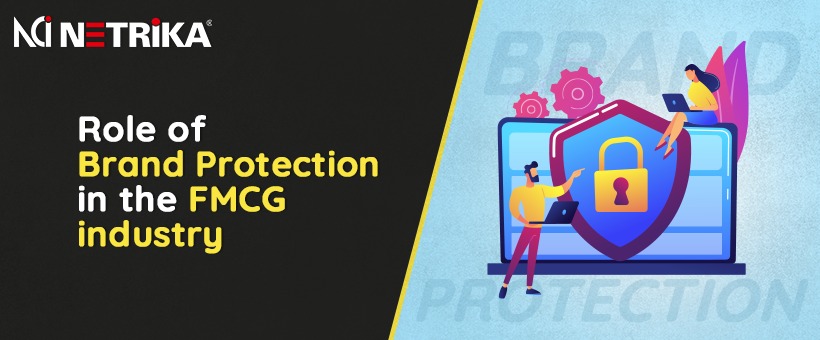- June 13, 2024
- Posted by: Netrika
- Category: Brand Protection

The FMCG (Fast-Moving Consumer Goods) industry encompasses products that are sold relatively quickly and are quite affordable for the general public. These products can range from beverages, food items, toiletries, or daily household items. The FMCG industry is considered the 4th largest sector contributing to the Indian economy. However, it is this relatively low cost, low profit margin, rapid turnover, and high demand for FMCG products that have made this industry fiercely competitive and vulnerable to counterfeiting. In fact, as per the latest reports, the FMCG industry in India accounts for a staggering 20% of counterfeits. These statistics are both alarming for the Indian economy as well as threatening for the health and safety of consumers.
Moreover, substandard counterfeit products pose a threat to the brand’s reputation, holding the capability to completely wipe out the brand’s business. This challenge has escalated even more with the digitization, proliferation of e-commerce giants, and growing social media platforms. Therefore, having a robust brand protection strategy in place has become a requisite for organizations, whether they operate at a small local scale or on the global platform.
Role of Brand Protection in the FMCG Industry
Brand protection holds paramount importance in securing the value and integrity of FMCG products, thus keeping the product relevant in the market, and ensuring customer loyalty and trust. Brand protection strategy incorporates measures such as intellectual rights against infringement, unauthorized use, and counterfeiting to preserve the brand’s reputation and integrity.
- When products of a genuine FMCG brand are counterfeited, you run the risk of losing customers’ trust as well as damaging your brand’s reputation and suffering significant financial loss. Brand protection methods that keep up with technology advancements are essential for organizations, regardless of size. Strategies and measures under brand protection allow professionals to continuously monitor the online and offline market and identify unauthorized or counterfeit products. Brand protection specialists leverage the latest practices and cutting-edge tools to track suspicious activities, and cease-and-desist letters, and follow legal proceedings and takedown requests to safeguard the brand’s integrity.
- If you are an FMCG brand selling a product and you have filed for a trademark on that product under your brand name, there is every chance that someone will attempt to pass for that product, sell it as a fake, and profit from the sales. As long as the product is being sold under your brand’s name, you will continue to lose money in addition to losing the trust of your customers, who will eventually criticize the product’s quality and damage your brand’s reputation. Trademark protection and intellectual property are essential parts of the ecosystem for brand protection and security. To safeguard the brand’s assets, reputation, and identity while also avoiding confusion with other firms, it entails registering the brand name, logo, tagline, and product name. Brand protection strategies help keep your intellectual property safe and make it easier for customers to recognize your product apart from imitations or similar ones.
- Cyberspace has turned into a haven for bad actors who are well-equipped to damage an FMCG brand and profit from it. These malicious actors use techniques like phishing, and domain spoofing to target your FMCG website trying to make its way through the customer base. Brand protection secures a company’s reputation and intellectual property. Online brand monitoring does entail keeping an eye on its online presence continuously and proactively. By taking this precaution, FMCG businesses may reduce risks, make sure their brand image stays true to their vision and objective, and maintain their customers’ loyalty.
- Brand protection practices involve vetting the supply chain, promoting its transparency, and traceability, and implementing robust measures to manage its desired operation. As supply chain for an FMCG product, especially in the digital age is an extremely critical line that needs strict quality control. Therefore, brand protection focuses on meticulous management systems that make it easier to track and trace the product throughout the supply chain, identify potential vulnerabilities, and enable proactive measures to protect the integrity of the product.
In addition to the above role, brand protection strategies also ensure compliance with intellectual property laws and regulations, protecting the FMCG industry from penalties and legal disputes. Additionally, with brand protection strategies in place, customers can be rest assured of the quality of the product, thus protecting their safety and health. Moreover, securing the credibility and reputation of the brands also upholds customer trust and loyalty.
How does Netrika use brand protection to expedite anti-counterfeit solutions?
In India, the FMCG counterfeiting market is growing at an alarming rate of 44.44%, which is even higher than the growth of the FMCG industry itself. While the FMCG industry is expected to guarantee the authenticity of products across the supply chain and purchasing line, the counterfeit market is challenging businesses, leading to higher threats in business investments, customer decline, loss of revenue, and brand loyalty & integrity loss.
To help businesses battle the brand vulnerability problem, Netrika Consultancy offers best-in-class brand protection services. We are committed to helping businesses sustain and thrive in the ever-evolving digital landscape and reach their ultimate aim of enhanced revenue and brand protection. We continuously investigate technology breakthroughs in the anti-counterfeiting industry and combine state-of-the-art technology with the best experts to steer your company services toward success and expansion. With customizable services, our tailored anti-counterfeit solution matches the landscape of industries, giving your products a unique identity and removing the possibility of a fake.
